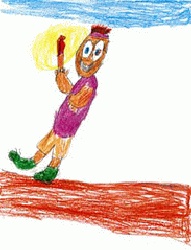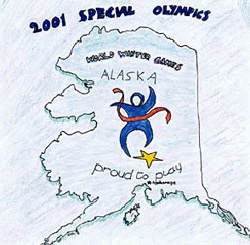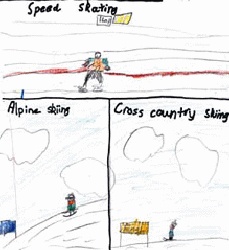 |
| 'Torch Carrier' by William Willis |
 |
Proud to Play
By Ryan Schlueter
Chugach Optional, grade 6
The Special Olympics are the reuniting of brothers separated by an unseen gap, brought back together by a competition. A competition, just for these special athletes who don’t come for the medals and don’t come for the ribbons but for those who come for the opportunity to play. Some may come in small packages but they carry a warm heart and a lively personality. If you cry, they cry with you. If you laugh, they laugh with you, and if you are lonely then they lend you a smile. They are the athletes of the 2001 Special Olympic World Winter games Alaska, and they come, proud to play.
Background (an excerpt)
By Jayme Gillilan
Bartlett High, grade 11
 |
| '2001 Special Olympics' by Taylor Allen, Jamil Jangda, and Carter Marvin, 5th grade |
 |
The Special Olympics started on July 20, 1968, when Eunice Kennedy Shriver organized the First International Special Olympic Games at Soldier Field in Chicago. Today, it is an international program of year-round sports training and athletic competition for more than one million children and adults with mental retardation.
Individuals with mental retardation are given continuing opportunities to develop physical fitness by training for a variety of Olympic-type events in which they might want to compete. The athletes have a chance to travel around the world and see different cultures and ways of life along with having the thrilling excitement of meeting different people. They are also afforded an opportunity to demonstrate courage, experience joy, and participate in a sharing of gifts, skills, and friendship with their families, other Special Olympics athletes, and the community in which they are competing.
The athletes train for the Special Olympics just as any other performer would train for competition, whether it be for statewide or national programs. They all work hard during practices, and when competing they have fun and enjoy themselves to the fullest no matter what the outcome. Some of the athletes train for many years to be able to go to and compete in Special Olympics. When they finally get the chance to perform, they are proud to show the world what they have achieved and what their future can hold for them.
 |
| 'Skating and Skiing' by Ryan Monahan, 4th grade |
 |
Local Preparations -- Anchorage Gears Up (an excerpt)
By Marissa Moon
Chugiak High, grade 11
News of the Special Olympics in Alaska this year had been widely circulating for many months. Organizations such as local businesses, schools, and private community groups had been doing endless work in preparation for the coming of the games and the athletes. In the cities of Anchorage and Eagle River, posters and banners had been prominently hung advertising the games and asking for volunteers. Because of the thousands of volunteers needed, opportunities to sign up were everywhere. And the results were overwhelmingly fruitful. Within just a few months of asking for volunteers, Alaska had supplied absolutely all of the necessary help. People were eventually even turned down for lack of empty positions. All of Alaska seemed to be filled with anticipation and excitement.




